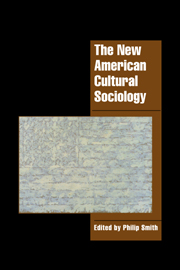Book contents
- Frontmatter
- Contents
- Notes on contributors
- Preface
- The new American cultural sociology: an introduction
- PART I Culture as text and code
- 1 Textuality and the postmodern turn in sociological theory
- 2 The computer as sacred and profane
- 3 AIDS and the discursive construction of homosexuality
- 4 Fundamentalism and liberalism in public religious discourse
- 5 Analytic and concrete forms of the autonomy of culture
- PART II The production and reception of culture
- PART III Culture in action
- Index
- Title in this Series
2 - The computer as sacred and profane
Published online by Cambridge University Press: 18 January 2010
- Frontmatter
- Contents
- Notes on contributors
- Preface
- The new American cultural sociology: an introduction
- PART I Culture as text and code
- 1 Textuality and the postmodern turn in sociological theory
- 2 The computer as sacred and profane
- 3 AIDS and the discursive construction of homosexuality
- 4 Fundamentalism and liberalism in public religious discourse
- 5 Analytic and concrete forms of the autonomy of culture
- PART II The production and reception of culture
- PART III Culture in action
- Index
- Title in this Series
Summary
The gradual permeation of the computer into the pores of modern life deepens what Max Weber called the “rationalization of the world.” The computer converts every message – regardless of its substantive meaning, metaphysical remoteness, or emotional allure – into a series of numerical bits and bytes. These series are connected to others through electrical impulses. Eventually these impulses are converted back into the media of human life.
Can there be any better example of the subjection of worldly activity to impersonal rational control? Can there be any more forceful illustration of the disenchantment of the world that Weber warned would be the result? Much depends on the answer to this portentous question, for discourse about the meaning of advanced technology demarcates one of the central concerns of social theory. If the answer is yes, we are not only trapped inside of Weber's cage of iron but also bound by the laws of exchange that Marx asserted would eventually force everything human into a commodity form.
This query about the rationalization of the world poses theoretical questions, not just existential ones. Can there really exist a world of purely technical rationality? Although this question may be ideologically compelling for critics of the modern world, I will argue that the theory underlying such a proposition is not correct. Because both action and its environments (Alexander 1982-1983, 1988a) are indelibly interpenetrated by the nonrational, a pure technically rational world cannot exist. Certainly the growing centrality of the digital computer is an empirical fact. This fact, however, remains to be interpreted and explained.
- Type
- Chapter
- Information
- The New American Cultural Sociology , pp. 29 - 46Publisher: Cambridge University PressPrint publication year: 1998
- 6
- Cited by

